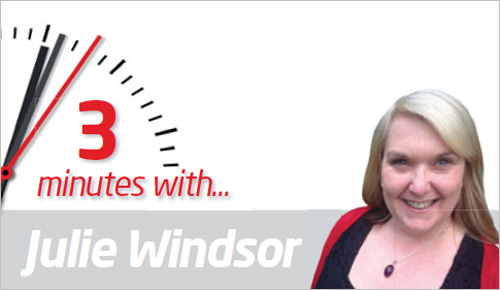Julie Windsor’s passion for reducing falls has led to her taking on a top job in risk reduction and falls prevention at NHS England

Tell us about your role at as patient safety lead at NHS England.
I joined the NHS England patient safety support and guidance team as the lead for older people and falls in February. The new, exciting role and demonstrates the organisation’s commitment to reducing harms from and improving outcomes for older patients at risk of falls.
Last year more than 230,000 falls were reported in NHS acute and community care settings. This is the largest group of all patient safety incidents (17 per cent) resulting in severe harm, such as hip fracture or head injury.
Therefore, working to advise and support commissioners and providers to influence and improve evidence-based assessment and interventions will be my top priority. My role is quite diverse as the care of older people spans many areas so I find myself working closely with other leaders such as those working with dementia and frailty.
Have you always worked in falls prevention?
Anybody that has ever met me will know that I am passionate about falls and having been an older persons nurse for 28 years with the last 10 devoted to falls. I have been very fortunate to have been involved with many national falls programmes over the years alongside my day job as a falls specialist nurse. I haven’t left clinical work entirely behind me and continue to work in clinical practice as much as possible, I believe it’s important to stay connected to grass roots nursing and remember that patients are at the heart of everything we do.
Does falls prevention have a high enough profile? If not, how can physiotherapy staff help?
Falls does have a reasonably high profile I think and certainly my inbox every day is full of requests for advice about how to make services better and also full of innovative ideas of how to turn evidence and guidelines into reality for every day practice.
Falls prevention work is truly interdisciplinary and it’s difficult to think of a single specialty where the care of older people would not benefit from physio input. The evidence base for physio interventions as part of a multifaceted falls intervention programme in rehab or intermediate care settings is good mainly because older people need time to achieve their goals and this is challenging on fast paced acute wards, but the programme could begin there and then be followed up on discharge by referral to appropriate strength and balance classes where available.
At its most basic level though, even working with nursing staff to make sure that patients who usually have a frame at home have access to one in hospital, is a good place to start. Also, make sure that your hospital falls prevention group has a physiotherapist a member of the group!
You spoke at the recent national patient safety congress in Liverpool. What was your ‘take home’ message?
That the evidence is there ... multiple interventions, delivered by multidisciplinary teams and built around individualised falls assessments of risk, work. Falls prevention is ‘everyone’s business’ ... physiotherapists play a key role in this.
How will you know if you are making a difference in your role?
Ultimately, that the national falls audit programme starts to show we are making improvements in the provision of evidence-based interventions for older people in care settings in England and Wales, and that the numbers of reported falls to the National Reporting and Learning System start to reduce. I am aware of the excellent practice out there with innovative ideas delivered with passion by committed clinicians.
Have you got any holiday plans?
Staying at home this year and taking in a couple of music festivals with friends in my trusty old camper van finishing up with some (quieter) walking in the Peak District. fl
Author
Frontline StaffNumber of subscribers: 0




































